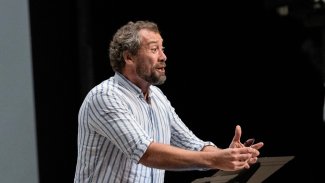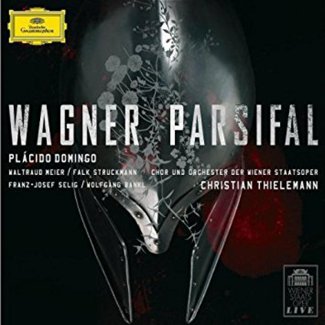

Ain Anger
Shirley Thomson
Clare Erskine
“One of the great Wagner basses of our time.”
(Tim Ashley, The Guardian)
His dark-grained, timbre-rich voice and powerful stage presence have made Estonian bass Ain Anger a mainstay of the world’s most celebrated stages, building an extensive repertoire of the most demanding principal bass roles in the classical repertory. Honoured as Kammersänger by the Austrian government in 2020, Anger has sung more than forty roles at Wiener Staatsoper, including Dosifei in Mussorgsky’s Khovanshchina conducted by Semyon Bychkov, König Heinrich in Lohengrin with Christian Thielemann, Commendatore in Barrie Kosky’s Don Giovanni under Philippe Jordan, and several roles of the Verdi repertoire including Filippo II and Il Grande Inquisitore (Don Carlo), Zaccaria (Nabucco), Fiesco (Simon Boccanegra) and Sparafucile (Rigoletto).
Among Ain Anger’s 2024/25 season commitments are his return to Teatro alla Scala as Fafner in Sir David McVicar’s new cycle of Der Ring des Nibelungen conducted by Christian Thielemann, as Hagen in Pierre Audi’s new production of Götterdämmerung for La Monnaie under Alain Altinoglu, and Dosifei in Khovanshchina under Esa-Pekka Salonen for the Helsinki and Stockholm Festivals and at the Salzburg Easter Festival in Simon McBurney’s new production.

See more
Renowned as one of today’s finest Wagnerian basses, Ain Anger made his Bayreuther Festspiele debut as Fafner in Das Rheingold and Siegfried under Christian Thielemann, and his debut at Teatro alla Scala as Daland (Der fliegende Holländer) under Hartmut Haenchen. As Hunding, he has appeared in new Ring Cycles at Bayerische Staatsoper under Kent Nagano, Wiener Staatsoper under Franz Welser-Möst, Oper Frankfurt under Sebastian Weigle, Lyric Opera of Chicago under Sir Andrew Davis, and Royal Opera House, Covent Garden under Sir Antonio Pappano. As Pogner (Die Meistersinger von Nürnberg), Anger debuted at San Francisco Opera under Sir Mark Elder, and he is a frequent guest at Deutsche Oper Berlin with whom he also appeared at BBC Proms in Tannhäuser under Sir Donald Runnicles. Recent seasons have brought expansion of the repertoire with debuts as Hagen (Götterdämmerung) for Canadian Opera Company conducted by Johannes Debus, and at Edinburgh International Festival with Sir Andrew Davis, and as König Marke (Tristan und Isolde) with Cleveland Orchestra under Franz Welser-Möst, at Palau de les Arts Reina Sofiá with James Gaffigan and with West Australian Symphony Orchestra under Asher Fisch (released on CD by ABC Classics). His most recent performance as Daland with Hong Kong Philharmonic Orchestra under Jaap Van Zweden is due for release on disc upcoming by Naxos.
Highlights of a vast career thus far include Anger’s acclaimed first performances as Boris Godunov in Richard Jones’ production at Deutsche Oper Berlin, the same production that marked his debut at the Royal Opera House, Covent Garden in the role of Pimen. It was also Pimen that marked his debut at the Metropolitan Opera, the first Estonian artist to sing on that stage, and his recent return to Teatro alla Scala in the opening production of the 2022/23 season under Riccardo Chailly. At Opéra National de Paris, he has performed most recently in new productions of Boris Godunov and Don Giovanni and is a regular guest at Bayerische Staatsoper where he has sung several of his core roles as well as Cardinal Brogni in Halévy’s seldom-performed La Juive under Bertrand de Billy.
On the concert stage, Anger’s recent appearances include Mahler’s Symphony No.8 at Teatro alla Scala with Riccardo Chailly and with NHK Symphony Orchestra and Paavo Järvi, Verdi’s Messa da Requiem with Orchestre Philharmonique de Strasbourg under Aziz Shokhakimov and Accademia Nazionale di Santa Cecilia with Daniel Oren, Haydn’s Nelson Mass with Münchner Philharmoniker conducted by Omer Meir Wellber, Beethoven’s Symphony No.9 with Wiener Symphoniker conducted by Gianandrea Noseda and upcoming this season with Gewandhausorchester under Andris Nelsons.
Gallery








“The best singing came from Jongmin Park and Ain Anger as the sonorous giants”
“The cast of experienced Wagnerians was similarly solid. Ain Anger’s Daland and Richard Trey Smagur’s Steuermann dispensed their respective lows and highs with rich vocal fluidity. ”
“Authoritarian, effective and efficient in this rough character is the Hermann of the Estonian bass Ain Anger”
“Ain Anger shone as Landgrave Hermann with a soft, carrying, timbre-rich bass voice.”
“Ain Anger’s presentation was dramatically multi-faceted. The Prince Gremin of this Kammersänger was not, as is usually the case, a stiff old moneybag, but had a sovereign nonchalance. And Anger’s great aria: Chapeau.”
“The ideally dignified, vocally magnificent Ain Anger (Pimen)”
“Ain Anger is a powerful Hunding whose evil is fearsome.”
“Even real giants could not have sung and acted the role of the lumbering Fafner more convincingly than Ain Anger.”
“The Pater Profundus of the Estonian bass Ain Anger shines with a robust and dark-grained tone.”
“Ain Anger’s Commendatore was intelligently sung, paying commendable attention to the words as well as to overall aura.”
“Ain Anger was an expressive, big-voiced Gremin.”
“Bass Ain Anger made for a robust, handsome Prince Gremin. The vibrancy of his voice and the mist of romance with which he infused his Act III aria was particularly effective.”
“Ain Anger embodies the Commendatore with charisma and a strong stage presence. The darkness that characterizes his timbre is manifested in the resonance of his voice. His brief appearance is enough to command attention by the sheer precision and gravity of his voice, in all its registers.”
“Like the production, the basses portraying Pimen and Boris could not have been more different in vocal quality and delivery. And both René Pape and Ain Anger delivered devastating performances…Ain Anger was making his Met debut as Pimen and from the moment he stepped on stage, he was a strong presence. His Pimen was measured in his body language, yet he was able to portray the torment in his character with subtlety. As he began telling the story of Russia, Anger sang with a clarion tone full of smooth legato lines and gorgeous dynamic contrasts. His pianos were full of warmth while his fortes were formidable. As he became increasingly agitated in the recounting of Boris’ treasonous actions, his voice took on a breathier tone but it never lost the elegance or smoothness. During these moments Anger showed an intensity in his voice that filled the house with a thunderous sound.”
“This staging is the occasion for several accomplished Met debuts: the bass Ain Anger, commanding as the monk Pimen, who predicts Boris’s downfall.”
“As Senta’s father Daland, Ain Anger embodied the good-humoured opportunist who willingly sells his daughter for a few sparkling stones. He’s the ideal rugged sailor, with a rough voice – coloured by saltwater and grain – and impresses here with his broad, distinctive bass.”
“Have the two giants Fasolt and Fafner ever been heard with more splendid voices than those of Ain Anger…?”
“The match between gestures and words is also noticed in Ain Anger portrayal of Hagen. The depth and intensity of his voice give the character a very strong dynamic.”
“Ain Anger’s Marke is delivered with grandeur and wounded nobility; overall it’s a distinguished performance, his famous lament memorably realised, with a touch of the epic about it.”
“Ain Anger’s Hagen brought to mind a Don Giovanni reincarnated as the devil – smooth, suave, saturnine”
“An exemplary Hunding by Ain Anger.”
“Ain Anger was a refreshing, non-hammy Hagen, a smooth-voiced villain feigning the part of honest broker to his idiotic half-siblings.”
“Ain Anger presented a lean and mean Hagen, a baleful presence who needed no recourse to phoney histrionic snarling to suggest his villainy.”
“Particularly Ain Anger’s splendidly world-weary, implacable Hagen.”
“the Estonian bass Ain Anger was supremely regal as König Marke.”
“The stunning talent of Ain Anger was wasted as Hunding.”
“…the night’s true discovery was Ain Anger’s Marke. It’s a luxurious bass instrument that you could quite happily take a bath in, and the Estonian bass was nothing short of brilliant as the wronged King of Cornwall. Naturally imposing, with oodles of presence, he showed audiences a man who has discovered an irreparable fracture in his world.”
“Estonian bass Ain Anger was a wonderful King Marke, with rich resonant tone and confident deep notes, as well as cutting a noble figure.”
“The role has surely never had a more jaw-droppingly powerful interpreter than Estonian Ain Anger, the real bass article and an artist with an ability to lift the key drama right off the page”
“As the axe-bearing Hunding, Ain Anger’s menacing presence was vocally resplendent across his range.”
“the excellent, glowering Ain Anger”
“Ain Anger, on the hand, offers unfailingly superb vocalism as Hunding, combining toughness with a sexiness one doesn’t often find in this character”
“Ain Anger graduated from Pimen – his part at Covent Garden – to give a rounded and moving portrait of the title role, both vocally and dramatically. His large, wide-ranging bass accommodated easily the Tsar’s pained outbursts while finding intimate tones for the familial scenes.”
“Ain Anger’s noble, stentorian Dosifey”
“Towering above all physically, vocally and dramatically, however, was bass Ain Anger as Dosifei. It was a monumental performance of the mystical, fanatical, uncompromising religious zealot that was the bedrock of the production”
“Anger, blessed with a wealth of charisma as the leader of the Old Believers, easily overshadowed Furlanetto in the demonstration of vocal potency, and the Estonian succeeded in miraculously nuanced, thoughtful tones in the first movement”
“Estonian bass Ain Anger was well cast as Dosifey, leader of the Old Believers, impressively rolling out unforced waves of well-founded singing”
“Best were Ain Anger as warmly eloquent Dosifey”
“Ain Anger had a massive and minatory dignity as the leader of the Old Believers.”
“After incarnating a Pimen of beautiful stature, Ain Anger reveals a great Boris. The nobility of tone he cultivated in the character works with his complex composition of the tsar, which more subtly reflects the suffering. Suddenly, the impressive vocal authority has nothing to do with these too often overdue arguments: sober, powerful, dense, this Godounov has impact in his interrogative and spiritual presence.”
“His exceptional monologue in the fifth scene was notable less for its anxiety than its calm intelligence and hints of resignation: in his gentle phrasing, punctuated by moments of rising doubt, one could discern a tsar who was only beginning to understand that his own life was subject to forces beyond his control. In the equally impressive final scene Anger managed to avoid the obvious pitfalls of vocal overacting, instead summoning nobility and clarity for Boris’ final address to his son.”
“In the title role Ain Anger convinces vocally with a powerful performance, rich in nuances.”
“Ain Anger enters the scene as Godunov… The Estonian, who sings this role for the first time, has something Christ-like with his long smoothed hair; his deep, penetrating bass is permeated with honest felt emotions — poetic, desperate, but also powerful. Voice and appearance are of touching fragility and at the same time of Old Testament power… they are all surpassed by Ain Anger, who also makes the dying scene, which is fundamentally ridiculous, into a character study.”
“In the title part, Ain Anger convinces vocally and with dramatic nuance.”
“Ain Anger, a brooding, dark Fafner”
“Ain Anger [is] a powerful Cardinal Brogni”
“There was the added bonus that Terfel’s voice contrasted well with the far darker sound of Ain Anger’s Pimen, an assumption that rivaled and at times surpassed that of Terfel. Pimen’s long monologues in Part Two were an example of someone completely inside a part, from the resonant opening (“Just one final tale”) through to the climactic strains of his witnessing of “the bloody sin”.”
“When was the last time you heard a room-filling, well-modulated, magnificent bass as that of Ain Anger? His Brogni captivates from the first note.”
“[Ain Anger] has all the characteristics of the most profound Russian basses; namely cavernous authority and the narrative articulation to match. He is utterly commanding in this repertoire, not just in setting the narrative scene – showing that you don’t need an opera stage to tell a story – but especially when he spoke the words of Death himself, booming with authority when, for example, he spoke the words “You are mine!” at the end of the Serenade. His is a voice you don’t argue with and you don’t forget.”
“Ain Anger was outstanding as the monk Pimen, relating the tale of the Tsarevich’s murder in a bass voice that came down the centuries”
“There is real darkness in the rich-toned chronicling of Ain Anger’s Pimen”
“Notable in the strong cast are Ain Anger’s rugged Pimen”
“Ain Anger, as the monk Pimen, has wonderfully sympathetic gravitas”
“… bass Ain Anger as the Pater Profundus evoked scenes of the sublime in nature with a potent, focused delivery.”
“Ain Anger’s mellow, booming bass voice perfectly suited Peneios”
“The splendid bass Ain Anger excelled as Daphne’s father Peneios”
“As Dosifey, Ain Anger was enormously impressive : a tall, imposing stage presence, he rolled out his phrases in a generous, beautiful bass, mixing dignity and dangerous charisma in his characterization.”














